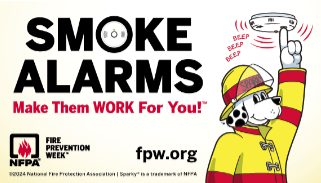Associate Member Spotlight: E.S.C.A.P.E. Fire Prevention Week 2024 Tips
October 4, 2024


Contact Firefighter Michael McLeieer, president of E.S.C.A.P.E. Inc.
Cell: 269-217-9739 / email: michael.mcLeieer@escapeinc.org
Fire Prevention Week 2024 (October 6 – 12, 2024)
Smoke Alarms. Make Them WORK for You!™


As of September 28, 2024 – 73 people have died in 70 fires throughout Michigan. In 2023 (January –December) 125 people died in 112 fires throughout Michigan. Most of these deaths occurred in homes without working smoke alarms.
That’s why E.S.C.A.P.E. Inc. is partnering with the National Fire Protection Association (fpw.org), Michigan fire departments and the Michigan Association of Broadcasters to raise awareness of the importance of having working smoke alarms in every home throughout the Great Lakes State.
National Key Campaign Points:
- Working smoke alarms save lives, cutting the risk of dying in a home fire in half. Install. Test. Replace. Many fire departments throughout Michigan install smoke alarms at no cost.
Install:
- Smoke alarms should be installed and maintained on every level of the home including the basement. Install alarms in every sleeping room and outside each separate sleeping area.
- Interconnect all smoke alarms throughout the home for best protection. When one alarm sounds, they all sound. Make sure everyone can hear the sound of the alarm throughout the home.
- Sleep with your bedroom door closed.
- Install smoke alarms (photoelectric) at least 10 feet from a cooking appliance (the kitchen) to prevent nuisance alarms.
- New multi-criteria smoke alarm technology will state “helps reduce cooking nuisance alarms” on the packaging. Consider using this new technology.
Test & Replace:
- Test smoke alarms at least monthly pressing the test button.
- Make sure everyone in the home understands the sound of the smoke alarm and knows how to respond.
- Smoke alarms with non-replaceable (long-life) batteries are designed to remain effective for up to 10 years. If the alarm chirps, warning the battery is low, replace the entire smoke alarm right away.
- For smoke alarms that do not have non-replaceable (long-life) batteries, replace batteries at least once a year. If the alarm chirps, replace only the battery right away.
- Replace all smoke alarms when they are 10 years old.
People Who Are Deaf or Hard of Hearing:
- Install smoke alarms and alert devices that meet the needs of people who are deaf or hard of hearing.
- When the smoke alarm sounds, strobe lights flash and/or a device will shake the pillow or shake the bed to alert people who are deaf or hard of hearing of a possible fire when they awake.
Home Fire Escape:
- Make a home escape map. Draw each level of the home. Show all doors and windows.
- Practice the plan with everyone in your household, including visitors and overnight guests.
- Teach your children how to escape on their own in case you cannot help them. Make sure they can open windows, remove screens, and unlock doors.
- Have a plan for everyone in your home who has a disability.
- If a room has a window air conditioner, make sure there is still a second way out of the room.
- A closed door may slow the spread of smoke, heat and fire. Sleep with your bedroom door closed.
- Make sure everyone in your home knows how to call 9-1-1, or your local emergency number, from a cell phone or a trusted neighbor’s phone.
- Have an outside meeting place (something permanent, like a tree, light pole or neighbor’s house) a safe distance in front of the home where firefighters will easily find you.
- Make sure your house number can be seen from the street both day and night.
- Never go back inside a building that is on fire or full of smoke. Once outside, stay outside (Get Out and Stay Out).
- If there is smoke coming in from under or around the door or through the heat register, leave the door closed. Close and cover vents and cover cracks around the door with clothing, towels or tape to keep smoke out and find the second way out of the room.
